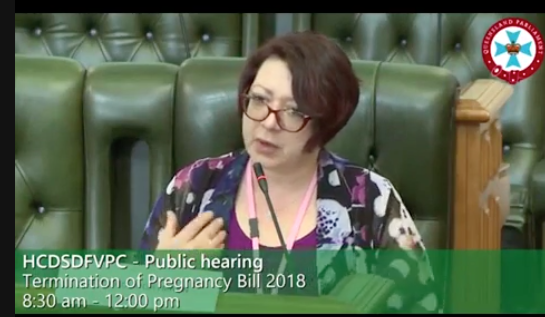Displaying items by tag: Debbie Garratt
Abortion Coercion Admitted
On 12th September Dr Carol Portman, one of Queensland’s only later term abortion providers spoke at a Committee Hearing for the Termination of Pregnancy Bill. When asked if she had ever experienced a woman attending for termination who may be experiencing her coercion, her response revealed all that typifies abortion discourse. A discourse that upholds the concept of ‘abortion rights’ above all else, even a woman’s right to be free from coercion, to be entitled to the highest standards of ethical medical care and the right to say ‘no’.
Submission to the QLD Termination of Pregnancy Bill Committee
The latest QLD abortion law reform effort was introduced on 22 August 2018, by the Attorney-General and Minister for Justice, Yvette D'Ath. This is the third such attempt to decriminalise abortion in the state in recent years. Organisations and individuals, including medical professionals, counsellors, and members of the public made submissions to a government-appointed committee, which will evaluate them and release a report on October 5th. The bill will then be debated in mid-October.
Misinformation Driving Legislation
When we allow dominant discourses based on misinformation to drive legislative change, nobody wins. Abortion advocates in Queensland are again pushing for decriminalisation based on a lot of myth and very little fact. The way in which the media allows this inaccurate portrayal of abortion is a sign of how low we’ve sunk in completely dismissing the evidence and the actual experiences of women. This article highlights a few of the very misleading tactics of the pro-abortion lobby in pushing an agenda that doesn’t serve the needs of women at all.
Promotion of Adoption as an Alternative to Abortion
Debbie Garratt has had many years of involvement in counselling women and has observed, first-hand, similarities in the grief experienced by both post-abortive women and women who lost their children to adoption. This article is intended to urge pro-lifers to consider the impact of adoption on biological parents and their children. It is not meant to judge or shame those couples who have adopted and often made great sacrifices to do so, but should serve to draw attention to the deep loss experienced by adopted children.
Coercion is more than just overt pressure
This is the second part of a briefing paper prepared by Debbie Garratt of Real Choices Australia. The first part critiques a recently-released draft White Paper from Marie Stopes Australia, which deals with the topic of Reproductive Coercion. Click here to read part 1. The majority (>95%) of terminations in Australia occur for psychosocial reasons including not having enough resources, whether financial or material, not feeling able to cope with a baby due to age or lack of support, fears about the impact of pregnancy and parenting on other life choices, as well as consideration for the needs of other people a woman cares for.
Reproductive Coercion: Coercion to Terminate a Pregnancy
This is the first part of a briefing paper by Debbie Garratt, of Real Choices Australia, on the topic of reproductive coercion. This article critiques a draft White Paper by Marie Stopes on reproductive coercion, while the second article examines the society's many subtle and coercive influences on pregnant women. Click here to read part 2. Marie Stopes, one of Australia’s biggest abortion providers recently released a draft White Paper entitled Hidden Forces: Shining a Light on Reproductive Coercion.
Another Successful Australian Abortion-Pill Reversal
The abortion industry would have women believe that once the first abortion-pill is taken, then their children's fate is sealed. But it is possible to save babies if intervention is made in time. In fact, more than half women who undergo an abortion-pill reversal go on to give birth to healthy babies. Abortion-pill reversal has been available for some years overseas but has yet to become widely accessible in Australia. Still, despite many obstacles, successful reversals have been taking place in this country. Below is the case study of one such successful procedure.













